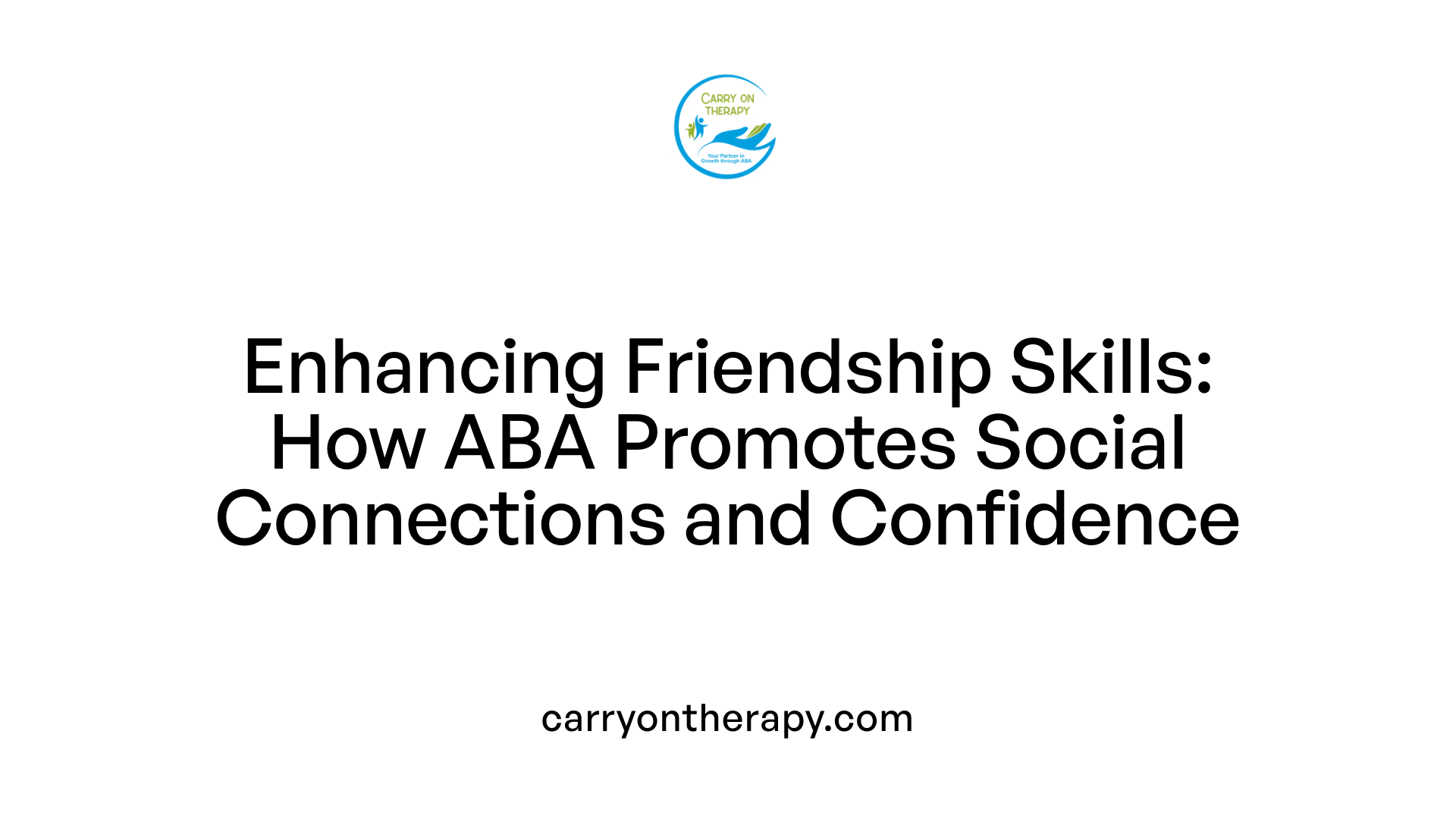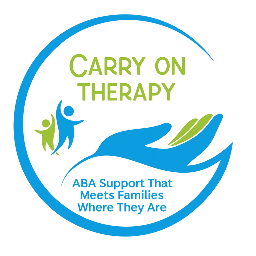Understanding Social Challenges in Autism
Developing friendship skills can be a significant challenge for individuals on the autism spectrum due to difficulties with communication, social cues, and emotional regulation. Autism therapy, particularly Applied Behavior Analysis (ABA), offers evidence-based strategies tailored to support social growth. This article explores how behavioral analysis and specialized therapy services empower individuals with autism to build meaningful friendships and social competence.
What Is Autism Therapy and How Does It Support Social Development?

What is autism therapy and how does it help individuals with autism?
Autism therapy refers to a range of treatment approaches designed to improve various skills for people with autism spectrum disorder (ASD), focusing especially on social development, communication, behavior, and daily living abilities.
These therapies are highly individualized and often involve multiple disciplines to tailor support to each person's unique strengths and challenges. Early intervention is important but therapy can be effective at any age, promoting independence and quality of life.
Applied Behavior Analysis (ABA) is one of the most widely used and evidence-based methods. ABA breaks down complex social behaviors into manageable steps, such as making eye contact and recognizing social cues, allowing individuals to learn and practice skills gradually and successfully. Techniques like role-playing, positive reinforcement, modeling, and peer interaction help build confidence and encourage the use of skills in real environments.
Other common therapies include speech and language therapy to improve communication, occupational therapy to support sensory and motor skills, and specialized social skills training. Families and caregivers play an essential role by reinforcing learning at home and in the community, which significantly enhances progress.
In summary, autism therapy supports social development through a personalized, multidisciplinary approach that focuses on skill-building, early and ongoing intervention, and active involvement of caregivers and educators to help individuals with autism thrive socially and independently.
The Role of Behavioral Analysis in Enhancing Social Competence
What role does behavioral analysis play in autism therapy?
Behavioral analysis, specifically Applied Behavior Analysis (ABA), is foundational in autism therapy. It systematically studies behaviors to identify strategies that encourage positive changes. The primary goal is to boost helpful behaviors like communication, social skills, and independence while minimizing harmful or obstructive actions.
Definition and goals of behavioral analysis
Behavioral analysis focuses on understanding the relationship between antecedents, behaviors, and consequences—the ABCs of behavior—to shape learning and social development. ABA harnesses this understanding to break complex social skills into manageable steps, ensuring learning occurs at an individualized pace depending on each person’s strengths and needs.
ABA and its scientific foundation
ABA is a rigorously researched therapy rooted in the science of learning and behavior. Since the 1960s, it has been widely used to support individuals with autism and related developmental disorders. Recognized by authoritative organizations such as the US Surgeon General and the American Psychological Association, ABA is an evidence-based practice that has demonstrated considerable effectiveness in improving social competence, communication, and other vital skills.
Techniques like positive reinforcement and the ABCs of behavior
A cornerstone of ABA is positive reinforcement, where desirable behaviors are immediately rewarded to encourage repetition. Therapists also use the ABCs of behavior to understand what triggers a behavior and what follows it, allowing targeted interventions. Techniques such as discrete trial training (breaking skills into small, teachable components), modeling, and role-playing further enhance skill acquisition.
Impact on social skills and independence
ABA's structured approach helps individuals master core social abilities such as recognizing social cues, initiating conversations, and participating in group activities. With therapy tailored to individual goals, consistent practice in varied settings encourages generalization, increasing confidence, fostering relationships, and ultimately promoting greater independence in social and everyday life.
| Aspect | Description | Impact on Social Competence |
|---|---|---|
| Behavioral Analysis | Systematic study of behaviors, using ABC model | Enables targeted interventions to promote helpful social behaviors |
| Positive Reinforcement | Rewarding desirable behaviors immediately | Encourages repetition and learning of social skills |
| Individualized Treatment | Tailored plans based on strengths, needs, and goals | Addresses specific social challenges effectively |
| Evidence-based Foundation | Supported by extensive research and clinical data | Ensures reliable improvements in social and communication skills |
| Skill Generalization | Practice in diverse settings (home, school, community) | Strengthens real-world application and independence |
In summary, behavioral analysis, through ABA, provides a well-supported framework that helps individuals with autism bridge gaps in social competence and build a foundation for an empowered, independent future.
Key Components of ABA Therapy for Social Skill Development
Breaking Down Complex Social Behaviors
ABA therapy helps individuals with autism by breaking down complex social behaviors into manageable, smaller steps. This approach allows clients to learn at their own pace, focusing on each part of a social skill individually before combining them into fluent interactions.
Techniques: Modeling, Role-Playing, Video Modeling
Several evidence-based techniques are central to teaching social skills in ABA therapy. Modeling involves therapists or peers demonstrating specific social behaviors for the client to observe and imitate. Role-playing provides opportunities to practice these skills in simulated social scenarios, enhancing understanding and confidence. Video modeling uses filmed demonstrations as visual guides, allowing repeated viewing to reinforce learning.
Positive Reinforcement Strategies
Positive reinforcement is a core strategy in ABA, where desirable social behaviors are immediately rewarded to increase their likelihood of repetition. Rewards can range from verbal praise to tangible incentives. This encourages clients to engage consistently in positive social interactions, gradually building their skills.
Discrete Trial Training and Natural Environment Teaching
Discrete Trial Training (DTT) breaks social skills into small, structured steps such as greeting someone or making eye contact, with immediate feedback provided. In contrast, Natural Environment Teaching (NET) uses everyday settings like snack time or playgrounds to teach and reinforce skills, encouraging spontaneous and practical use of social behaviors in real life.
These components work together to create personalized, effective ABA programs that support individuals on the autism spectrum to improve communication, social cues recognition, and meaningful social participation.
Creating Personalized Treatment Plans to Maximize Social Growth
Assessment and Individualized Goal Setting
Personalized treatment plans in ABA therapy begin with a thorough assessment conducted by trained behavior analysts (BCBAs). This evaluation examines each child's unique skills, needs, and interests to identify areas of strength and opportunities for growth. By gathering detailed information, therapists set specific, measurable goals tailored to enhance social interactions like initiating conversations and understanding social cues.
Addressing Strengths, Needs, and Interests
Each treatment plan focuses on leveraging the individual’s strengths while addressing their particular challenges. Customizing the approach ensures that therapy is relevant and engaging, promoting motivation and participation. For example, a child who enjoys storytelling might benefit from techniques such as social stories to boost comprehension of social scenarios.
Customized Social Skills Programs
Therapists design social skills programs that break down complex behaviors into manageable steps. These programs incorporate methods like role-playing, modeling, and discrete trial training to target skills such as eye contact, turn-taking, and emotional regulation. The goals are pragmatic, aiming to foster real-world social competence and improve quality of life.
Ongoing Data Collection and Progress Monitoring
Progress is continuously tracked through data collection and regular assessments. This approach allows therapists to adjust interventions based on how well the child responds, ensuring treatment remains effective and aligned with evolving needs. Caregiver feedback also plays a crucial role in shaping ongoing strategies to support social skill generalization beyond therapy sessions.
Family and Caregiver Involvement: A Pillar of Successful Therapy

Why is parental and caregiver participation important in ABA therapy?
Family and caregiver participation is crucial in ABA therapy because it ensures that social skills learned in therapy sessions are reinforced consistently at home and in day-to-day life. This ongoing support strengthens the child's ability to generalize new behaviors across different settings, leading to more sustainable improvements.
How are families trained to reinforce skills?
Therapists provide families with training focused on practical strategies such as role-playing, using social stories, and positive reinforcement techniques. This empowers caregivers to actively participate in teaching and encouraging social behaviors, making therapy a collaborative effort.
What are social stories and home practice?
Social stories are structured narratives that help children understand social cues and appropriate responses. Families use these stories, along with home practice exercises, to simulate social situations. These methods build the child's confidence and comprehension of social interactions in a comfortable environment.
How does collaboration with educators and therapists enhance outcomes?
Close collaboration among caregivers, therapists, and educators creates a consistent support network. Sharing progress, challenges, and strategies ensures that social skills are reinforced uniformly across school, home, and community settings, optimizing the child's development.
Engaging families as active participants transforms therapy into a holistic process that extends beyond sessions, significantly boosting social development for individuals with autism.
Generalizing Social Skills Beyond Therapy Sessions
Practicing Skills Across Home, School, and Community
ABA therapy emphasizes the importance of practicing social skills in multiple environments. By reinforcing learned behaviors not only within therapy sessions but also across settings such as home, school, and community spaces, individuals with autism can better generalize these skills. This widespread practice ensures that social skills become functional and adaptable to real-world situations.
Encouraging Spontaneous Social Interactions
A central goal of ABA is to move beyond structured learning and encourage spontaneous use of social skills. Therapists and caregivers work collaboratively to create opportunities where individuals can initiate and maintain social exchanges naturally. This approach helps build confidence and promotes independence in everyday social settings.
Role-Playing in Real-Life Scenarios
Role-playing is a practical ABA technique used to simulate common social situations. It allows individuals to rehearse conversations, respond to social cues, and navigate group interactions in a controlled yet dynamic setting. This preparation helps ease the transition to spontaneous social encounters outside therapy.
Reinforcement in Natural Contexts Like Playgrounds
Positive reinforcement strategies are applied within natural environments to strengthen social behaviors. For example, during playground interactions, desirable actions like sharing or taking turns are rewarded to encourage repetition. Reinforcement in such contexts makes social learning meaningful and relevant, increasing the likelihood of skill retention and generalization.
Benefits of Developing Friendship Skills Through ABA

How Does ABA Improve Communication and Understanding of Social Cues?
ABA therapy breaks down complex social behaviors into small, manageable steps, helping individuals with autism improve their communication skills. Techniques like modeling, role-playing, and discrete trial training teach children to recognize and respond to social cues such as eye contact, body language, and conversational turn-taking. This structured approach supports mastery of verbal and non-verbal communication that is crucial for making and sustaining friendships.
How Does ABA Build Confidence and Support Emotional Regulation?
By practicing social interactions in controlled environments and using positive reinforcement, ABA therapy builds a child’s confidence in social settings. Role-playing and video modeling allow children to rehearse social scenarios, reducing fear of the unknown. Additionally, social skills training includes emotional regulation strategies, enabling individuals to better manage their feelings during social encounters, which enhances their comfort and participation.
How Does ABA Help in Reducing Social Anxiety and Avoidance?
ABA addresses common social challenges like initiating conversations and participating in group activities through gradual skill-building and reinforcement. With repeated success and encouragement, children become less anxious about social interactions. Consistent family and caregiver involvement extends practice beyond therapy, helping reduce avoidance behaviors by encouraging regular social engagement in everyday life.
In What Ways Does Developing Friendship Skills Enhance Quality of Life and Independence?
Improving social skills through ABA fosters stronger friendships and better communication, which are essential for school, work, and community involvement. As individuals gain independence using learned skills, they experience increased self-esteem and a greater ability to navigate social environments. This not only enriches their daily experiences but also empowers future success and personal fulfillment.
Who Provides Autism Therapy and Behavioral Analysis Services?

Who Provides Autism Therapy and Behavioral Analysis Services?
Autism therapy and behavioral analysis services are delivered by a variety of trained professionals and organizations dedicated to supporting individuals with autism spectrum disorder (ASD). Licensed behavior analysts, particularly Board Certified Behavior Analysts (BCBAs), play a central role in designing and overseeing individualized treatment plans using evidence-based Applied Behavior Analysis (ABA) techniques.
Licensed therapists, autism behavior specialists, and multidisciplinary healthcare teams also provide interventions targeting communication, social skills, and adaptive behaviors. These professionals often collaborate closely with families to ensure strategies are reinforced across home, school, and community settings.
What Are the Eligibility, Assessment, and Referral Processes?
To qualify for autism therapy services, individuals typically need a formal ASD diagnosis from a licensed clinician. Upon referral, providers conduct thorough assessments to establish personalized goals based on the individual’s strengths, challenges, and preferences. These evaluations guide the creation of tailored ABA programs that focus on improving practical skills relevant to daily life.
How Are Services Delivered and Covered?
Service delivery is flexible, ranging from in-home and school-based therapies to clinical and community environments. Many providers also offer telehealth sessions, allowing continued support regardless of location.
Insurance coverage for ABA therapy and related autism services is frequently available through private insurance and Medicaid, provided the treatment is deemed medically necessary. Continuous progress monitoring and supervision by qualified BCBAs help ensure interventions remain effective and appropriate.
Families seeking services often receive referrals from pediatricians, psychologists, or educational professionals. This collaborative approach helps connect individuals to the proper resources for comprehensive autism support.
Scientific Research Supporting ABA Therapy for Social Skills

Clinical Evidence and Research Findings
ABA therapy is widely recognized as an effective intervention for improving social skills in individuals with autism. Research demonstrates that intensive ABA therapy—typically involving 25 to 40 hours per week over one to three years—leads to substantial gains in intellectual abilities, language, daily living, and social skills. Techniques such as role-playing and positive reinforcement have been shown to promote real-life social scenarios and encourage desirable social behaviors, thereby enhancing communication and interaction capabilities.
Endorsements by US Surgeon General and APA
Respected institutions, including the US Surgeon General and the American Psychological Association (APA), endorse ABA as an evidence-based practice. These endorsements underscore ABA's credibility and validate its efficacy in treating autism spectrum disorders. The therapy's scientific foundation and consistent positive outcomes have made it a recommended standard for behavioral interventions.
Impact of Intensive ABA on Social and Developmental Gains
Intensive ABA programs focus on breaking down complex social interactions into manageable steps, facilitating learning at the individual's pace. Through personalized treatment plans and continuous data-driven assessments, ABA helps improve essential social skills such as eye contact, emotional regulation, understanding social cues, and engaging in conversations. Family involvement further enhances progress by reinforcing skills across multiple environments, leading to greater confidence, independence, and quality of life.
Advancements from Neuroscience and Mental Health Institutes
Organizations like the Child Mind Institute contribute to advancing ABA therapy by integrating findings from neuroscience and mental health research. Their work on early detection, assessment, and intervention supports developing more targeted behavioral analysis techniques. Utilizing cutting-edge technologies and extensive data exchange initiatives, these institutes help refine ABA methods to better address the needs of neurodiverse populations, paving the way for improved diagnostic accuracy and more effective care.
Starting ABA Therapy: Steps to Begin Social Skills Development
Initial Consultations and Comprehensive Assessments
The journey to effective social skills development through ABA therapy begins with an initial consultation with trained behavior analysts, such as Board Certified Behavior Analysts (BCBAs). This consultation includes a comprehensive assessment to analyze a child's learning strengths, weaknesses, and specific social challenges. Evaluations may involve interviews, observations, and standardized tools to create an individualized understanding of the child's needs.
Collaborative Planning with Families and Therapists
Following assessment, families and therapists collaborate closely to design a personalized treatment plan. This plan takes into account the child's interests, family preferences, and targeted social skills like making eye contact, understanding social cues, or initiating conversations. Family involvement is essential to ensure that goals are meaningful and achievable in the child's everyday environments.
Setting Realistic Social Goals
Realistic and measurable goals are established based on the child's current abilities and future development. For example, a goal might be to practice turn-taking during play or improve the ability to recognize and respond to facial expressions. These goals are broken down into manageable steps, often using methods such as Discrete Trial Training and Natural Environment Teaching to facilitate skill acquisition.
Ongoing Adjustment and Progress Evaluation
Progress is closely monitored through data collection and regular assessments. This ongoing evaluation allows therapists and families to adjust goals and strategies as needed to ensure continuous improvement. Consistent home practice and community involvement further enhance generalization of social skills, fostering confidence and independence.
Together, these steps create a dynamic, evidence-based framework to launch ABA therapy successfully, supporting meaningful social development for individuals with autism.
Empowering Friendships and Social Independence
ABA therapy, grounded in science and tailored to individual needs, offers a transformative path for individuals with autism to develop vital friendship skills. Through systematic teaching, positive reinforcement, and family collaboration, it unlocks social potential and fosters meaningful connections. As research continues to validate its effectiveness, ABA remains a cornerstone in building confidence, communication, and lifelong social competence for those on the autism spectrum.
References
- How ABA Therapy Supports Social Skills Development in ...
- Applied Behavior Analysis (ABA)
- Child Mind Institute | Transforming Children's Lives
- How ABA Therapy Helps Teens Develop Social Skills
- How ABA Therapy Enhance Social Skills in Kids
- Applied Behavior Analysis (ABA)
- Applied Behavior Analysis (ABA)
You have to Start to be Great!






